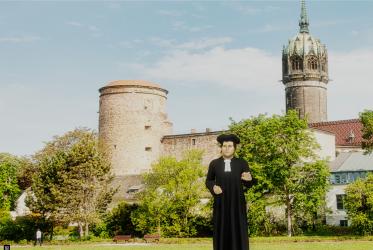Morning prayers at the Ecumenical Centre of the WCC, Geneva
“In the beginning was the Word”, is the motto adopted by state and church for their joint processes of planning and implementation to celebrate the anniversary of the Reformation. This motto is a winning idea. Why? Because one can interpret this motto in different ways depending on one's perspective.
Society and state associate this motto with the power of debating within a community about common objectives and in their dealing with conflicts. A groundless exercise of power is substituted by the discourse of free citizens answerable to their conscience. A subordinate subject becomes the free subject of democratic action. The Word – spoken, read, enacted – is an essential and indispensable medium of peaceful communication; a medium of education, art and culture. This foundation of a free and democratic orientation of culture, society and politics is, for us, connected most centrally with the events and experiences of the Reformation; and with good reason.
As church, we associate all these things with the motto, too. Hopefully, first and foremost, we associate it with the Word which comes to us from God. We associate it with the testimonies of Scripture, which inform us and give us an understanding of testimonies of faith and experiences of God, and which lead us to faith. For us, the Biblical Word provides us with clear orientation and a framework for all our debates, all our seeking in faith, all our spiritual life: Sola Scriptura and Solus Christus as the external and internal foundation of sola gratia and sola fide.
Instead of “At the beginning”, the prologue of St John's gospel says “In the beginning”. This does not identify a certain time span, but an ultimate ground, an ultimate source, an antecedent being, on which everything is founded and rests. This beginning is given to us. This beginning is meant to be declarative. It is confirmed and appropriated to us. At this point, the word “extra nos” proves helpful. This beginning is given to us. It is exactly this understanding of the beginning in the Word which pervades the prologue of St John's gospel.
However, it is not only the meaning of the word “beginning” which is profoundly different. It is also the word “Word” which has a profoundly different meaning than merely being a symbol in the process of conveying information and communication. The Word does not indicate a reality. It creates reality. It is reality. It becomes reality.
The Word is in the beginning, before creation, with God and is the creative medium for all creation. It becomes human existence, it becomes “flesh”: Jesus, his life and work, his preaching, his suffering, death and resurrection. This is the one Word God has to say to the world. Solus Christus! Creatio verbi divini! Before the beginning of time, God knew, God thought of it. And he shares this Word with his world, by allowing himself to be involved in this world. Et incarnatus est!
It all begins in the stable, at a place, where the wind blows, where it is cold at night. Not in the palace on soft blankets. And this is how it goes on. Those at the fringes are given special attention by our God. Jesus spends time with sick people, with swindlers, with women and children. His best friends are simple fishermen. And not only that; he allows himself to be put on the fringe. He allows himself be mocked and humiliated, he allows himself be tortured and crucified. At the beginning, there is the stable. At the end, there is the cross!
This shows us clearly that we do not have the Word, or any other understanding about God in any other shape or form than in that of some human existence, which cannot and should not escape from its cultural and historical roots. This is the reason for the many realities, the many languages, the many cultures. Every translation of the Bible into a different language, every one of its interpretations, every form of Christian life in all its contextual diversity, even contrariety, is an expression of this “Et incarnatus est”. This variety is not a deficit or disadvantage, but rather an expression of God's existence as “man who has taken on flesh” amongst us and in us with our historical and cultural influences and limitations. As his people, we are his gift to us and for us. This is the “ecumenism of gifts” at its most radical.
And why all this? - For love.
This is how St John's gospel interprets it. "For God so loved the world that he gave his one and only son..."(NIV) Creation itself is already an act of love. It was not enough for God to be with himself. It was not enough for him to have his Word for himself; to hear only himself, to have an eternal conversation with himself. This moved God out of himself into a counterpart. “Let us make people in our image, after our likeness” (ESV) He wanted for them a life full of light, full of trust and kindness. It was for love that he gave this counterpart freedom. Where there is pressure and domination, where people are not allowed to decide for themselves, there is no love. At most, there is self-love.
Similarly, there is no love where one no longer looks after the other. And because God saw that his beloved humans were in danger of falling prey to the darkness of a life far from God, he turned to them again in Jesus Christ and became one of them, the ultimate consequence of his love for them. “He came to that which was his own” (NIV). For love, he allowed himself to be entirely involved with this world, including - even especially - its dark sides, hatred, violence, fear and pain. He takes it upon himself to be rejected, treated with hostility and persecuted. He goes into the darkness and this is exactly what transforms it.
”In the beginning was the Word, and the Word was with God, and the Word was God...The Word became flesh and made his dwelling among us.”(NIV) These sentences contain the mystery of God. A mystery which is not to be fathomed in its entirety. For the rediscovery of this mystery in the gospel we have to search, to strive and to pray time and time again. This is the basic impetus of the Reformation: We can only ever draw close and closer. However, we may seek refuge in this mystery in prayer.
A summary of the Reformation perspective on this first sentence of St John's gospel is, for me, also expressed in the Barmer Theological Declaration, which itself is a rediscovery of the gospel:
Jesus Christ, as he is attested for us in holy scripture, is the one Word of God which we have to hear and which we have to trust and obey in life and in death.
As Jesus Christ is God's assurance of the forgiveness of all our sins, so, in the same way and with the same seriousness he is also God's mighty claim upon our whole life. Through him befalls us a joyful deliverance from the godless fetters of this world for a free, grateful service to his creatures.



